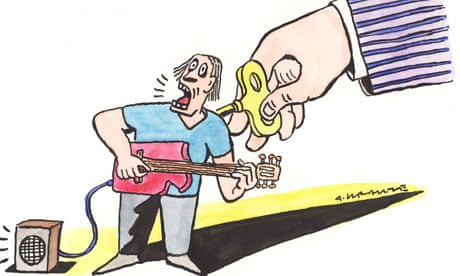In June British Airways premiered a TV advert intended to ram home its status as the "official airline partner" of the Olympics and Paralympics: 61 slightly alarming seconds, in which airliners taxied around the streets of London, and we were treated to the consummately postmodern trick of advertising masquerading as non-advertising: "Stay at home, support Team GB," ran the tagline.
The soundtrack, strangely enough, was the Clash's London Calling. There it was, heavily edited, blasting out in the midst of union flags and a vision of the capital restored to its swinging London-ish pomp, despite the fact that its lyrics suggested the exact reverse: "phoney Beatlemania has bitten the dust … we ain't got no swing … London is drowning, and I live by the river."
What to do? Wring your hands? Or acknowledge that this particular die was cast when the same band's Should I Stay Or Should I Go was used by Levi's jeans in 1991, and accept that popular music has long been an absurd carry-on in which hardened meanings are as transient as success, and it's axiomatic that nothing is sacred? Any lingering view to the contrary surely died in 2000, when Nick Drake's impossibly sad Pink Moon was captured by Volkswagen and used to advertise its Cabrio range, soundtracking a gang of hipsters marvelling at the night sky, motoring to a party and then putting the car in reverse and deciding to marvel at the night sky again – as usual, bohemia as reimagined by unutterable squares.
Last week, however, there came news of one person who wanted nothing to do with any of this. The Beastie Boys' Adam Yauch died of cancer in May, having played his part in the creation of 25 years of music that any ad exec would pay millions to get hold of. We now know that his will contained one very interesting clause: "Notwithstanding anything to the contrary, in no event may my image or name or any music or any artistic property created by me be used for advertising purposes."
Now, it would be easy to view this as one more act of self-righteousness from a group who often seemed to specialise in them. [With an estate valued at around $6m, and guaranteed royalties from his group's biggest-selling records that will swell his posthumous earnings, Yauch could afford such a stance – unlike the thousands of musicians who, with their industry nosediving, sometimes seem to sell their souls in order to eat. In Britain, moreover, any sniff of moralism from The Beastie Boys has long been met with the retelling of a tale from 1998, when the same people who had created Licensed To Ill — a brilliant album, but also home to some of the most sexist lyrics ever written — placed themselves on moral high ground to which they had no right, contacting the Prodigy and requesting them to desist from playing a largely instrumental track titled Smack My Bitch Up ("what a pious bunch of cunts," said The Manic Street Preachers' Nicky Wire, and he had a point)]
.But this move really counts for something. It chimes with much the same stance taken by Radiohead, Beck and REM. There are echoes of the statement issued by the surviving Beatles when Nike used the original recording of Revolution to sell trainers, and the argument that they "wrote and recorded these songs as artists and not as pitch- men for any product". Even if you're a musician stuck a few hundred rungs down the ladder, knowing that the music industry is on its uppers and the use of your music in an ad might get you through another year, it's not a bad ideal to bear in mind. If you're lucky enough to break big, it should be imprinted on your brain.
The trouble is that holding the line against the blurring of creativity and advertising can now look almost impossible. Sponsorship is ubiquitous, as proved by this coming weekend's annual V festivals – two days of promotion for the Virgin group, who push their trains, mobile phones and the rest – and Scotland's T in the Park, which pushes the great contributions to that country's culture and public health of Tennent's Lager. Jack Daniel's whiskey now pays for bands to do intimate gigs in the their hometowns (because, notwithstanding its parent company's annual revenues of $3bn, its brand is all about "roots"). By way of an illustration, consider the case of the White Stripes' Jack White, who pledged to restore music's soul and wound up writing a song for Coca-Cola entitled Love Is the Truth, which was nice.
And once a musician is dead, God help them – not least because, while US law gives the estates of dead stars control over the use of their image, in the UK no approval is required. With Yoko Ono's say-so, John Lennon's image has been used to sell Citroen cars. Most mind-boggling of all, in 2008, a portrait of Ian Curtis of Joy Division apparently wearing a pair of Converse trainers (a brand owned by Nike) was hurled around the globe. Did a man whose songs include Atrocity Exhibition and Dead Souls actually wear Converse? Even if he did, would he have been comfortable being reduced to selling them? There again, who cares?
Actually, I do. As I've acknowledged before, moaning about the state of pop music at the age of 42 is probably a futile and undignified thing. But if my ongoing sadness about the plight of such a beautiful, democratic form comes down to one thing, it is this: the washing away of all meaning, so that most contemporary musicians apparently have no language with which to convincingly sing about the world, and their forebears end up as nothing more than poster boys (and girls) for other people's very marketable notions of cool. To argue against all this may sound hopelessly naive; in such a dire financial climate for musicians, it also implies any future Beatles or Beastie Boys probably having to endure long years of penury, which is easy for me to advocate. But I stand by the basic point: to even start to avenge music's bland-out requires one thing – musicians distancing themselves from the machine, and returning to the noble ideal of art for art's sake.
Which brings us back to the Clash, a song from the London Calling album entitled Death or Glory, and a golden Joe Strummer couplet: "Every gimmick hungry yob digging gold from rock'n'roll / Grabs the mike to tell us he'll die before he's sold." His contention, aimed at himself as much as anyone, was that principles soon dissolve into mere poses, and the fast buck is always grabbed, sooner or later. But Adam Yauch proved otherwise. "I might stick around or I might be a fad / But I won't sell my songs for no TV ad," went a Beastie Boys song titled Putting Shame in Your Game. As it turns out, he meant it. And how great is that?

